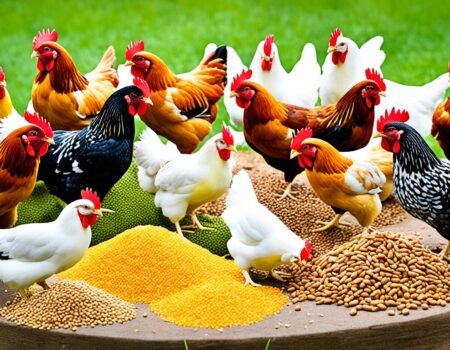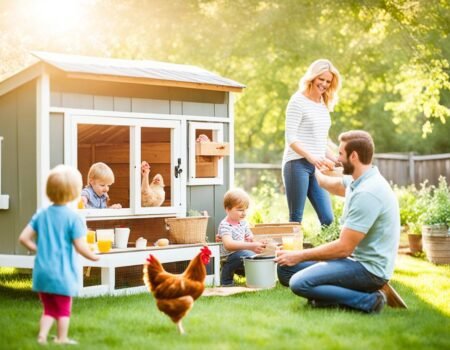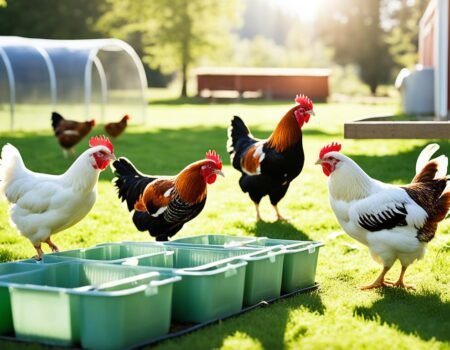Did you know that backyard chicken farming has become a popular trend in recent years? According to a survey conducted by the United States Department of Agriculture, there has been a significant increase in the number of households raising chickens for eggs in their own backyard. This surprising statistic highlights the growing recognition of the numerous benefits that come with raising chickens at home. From the advantages of egg production to the contributions to sustainable agriculture, keeping chickens can have a positive impact on individuals and communities.
By diving into the world of backyard chicken farming, we can explore the various reasons why more and more people are embracing this practice. From the joy of having access to fresh and healthy eggs to the opportunity to support sustainable food systems, raising chickens at home offers a multitude of advantages. Let’s discover these benefits and see why backyard chicken farming is gaining popularity.
Key Takeaways:
- Backyard chicken farming has experienced a significant increase in popularity in recent years.
- Raising chickens at home offers a range of benefits, including access to fresh and healthy eggs.
- Supporting sustainable agriculture and contributing to local food systems are other advantages of backyard chicken farming.
- Chickens can serve as natural composters and provide nutrient-rich fertilizer for gardens.
- Keeping chickens as pets can offer companionship, entertainment, and a connection to nature.
Access to Fresh and Healthy Eggs
By raising chickens in your backyard, you can enjoy the benefits of having a constant supply of fresh and healthy eggs. When compared to eggs from industrial farms, backyard eggs offer a superior quality that stems from the compassionate care and humane environment provided to the chickens.
Research indicates that eggs from pasture-raised chickens, which have ample space to forage and peck for food, are not only delicious but also more nutritious. These eggs boast higher levels of vitamin E and omega-3 fatty acids, promoting a well-rounded and healthy diet.
Having access to fresh eggs right at your doorstep allows you to savor the true taste of farm-to-table goodness. Whether you’re preparing a simple breakfast or indulging in a gourmet recipe, the flavor and freshness of backyard eggs will elevate your culinary creations.
The Nutritional Advantages of Backyard Eggs:
| Nutrient | Backyard Eggs (per 100g) | Conventional Eggs (per 100g) |
|---|---|---|
| Protein | 13g | 12.6g |
| Vitamin E | 3.78mg | 2.86mg |
| Omega-3 Fatty Acids | 386mg | 63mg |
| Cholesterol | 423mg | 424mg |
The nutritional composition of backyard eggs demonstrates their superiority in comparison to conventionally produced eggs. With higher levels of essential nutrients, they contribute to a well-balanced and healthy diet that promotes overall well-being.
Support for Sustainable Agriculture
Keeping backyard chickens allows us to support sustainable agriculture practices by providing them with certified organic chicken feed and allowing them to forage for their food. By adopting these methods, we contribute to the overall sustainability of food systems and promote environmentally friendly farming practices.
Organic chicken feed ensures that our chickens are consuming nutritious and chemical-free food, which translates into healthier and more flavorful eggs. By avoiding harmful pesticides and synthetic additives, we prioritize the well-being of our chickens and contribute to a more sustainable farming ecosystem.
In addition to organic feed, allowing our chickens to forage for their food is a natural and sustainable way to meet their dietary needs. Chickens have a natural instinct to search for insects, bugs, and plants, which not only diversifies their diet but also contributes to pest control in our gardens. This symbiotic relationship promotes a balanced and sustainable ecosystem.
Benefits of Supporting Sustainable Agriculture:
- Promotes biodiversity and ecological balance
- Reduces reliance on synthetic chemicals and pesticides
- Supports local and small-scale agriculture
- Minimizes environmental impact and carbon footprint
- Preserves soil quality and fertility
When we prioritize sustainable agriculture, we are not only benefiting our chickens but also taking an active role in building a healthier and more resilient food system.
By implementing sustainable farming practices in our own backyard, we become part of a larger movement towards responsible and eco-conscious food production. It’s a gratifying feeling to know that our actions contribute to the well-being of our chickens, the quality of our food, and the sustainability of our environment.
Next, let’s explore how backyard chickens can serve as natural fertilizers for our gardens and how they add value to our lives as lively and affectionate pets. But before that, take a moment to appreciate a visual representation of sustainable farming:
| Key Aspects of Sustainable Agriculture: | Benefits: |
|---|---|
| Organic farming | Minimizes chemical use and promotes soil health |
| Rotational grazing | Preserves pastureland and improves animal welfare |
| Composting | Recycles organic waste and creates nutrient-rich soil |
| Water conservation | Reduces water usage and protects natural resources |
Natural Fertilizer for Gardens
Did you know that backyard chickens can be valuable contributors to your garden’s health? Not only do they provide fresh eggs, but they also offer a natural fertilizer that can enhance the growth and fertility of your plants.
Composting is an essential practice for sustainable gardening, and chickens play a significant role in this process. They have a voracious appetite for kitchen scraps, including fruit and vegetable peels, coffee grounds, and even meat. By allowing your chickens to consume this organic waste, you not only reduce landfill waste but also provide them with a varied and nutritious diet.
But what makes chicken waste a valuable garden fertilizer? Well, chicken manure is rich in essential nutrients like nitrogen, phosphorus, and potassium. When added to your compost pile, it breaks down and enriches the organic matter, creating nutrient-rich compost that can be used to nourish your plants.
Additionally, chickens have a natural instinct to scratch and peck. This behavior not only aerates the soil but also helps to distribute the compost throughout your garden, ensuring that all areas receive the benefits of the nutrient-rich fertilizer.
Furthermore, chickens can be effective pest control agents. They forage for insects and other garden pests, reducing the need for chemical pesticides. By allowing chickens to roam freely in your garden, you can limit the presence of harmful pests and promote a healthier ecosystem for your plants.
| Benefits of Chicken Waste as Garden Fertilizer |
|---|
| 1. Provides essential nutrients like nitrogen, phosphorus, and potassium |
| 2. Enhances the organic matter in compost |
| 3. Promotes soil aeration and nutrient distribution |
| 4. Reduces the need for chemical pesticides |
By incorporating your chickens into your composting and gardening practices, you can create a sustainable cycle of nourishment and growth. Not only will you enjoy the benefits of fresh eggs, but you’ll also have a productive and thriving garden.
Experience the Power of Natural Fertilizer
One of our readers, Jane from Seattle, shared her experience of using chicken waste as garden fertilizer. She said:
“I’ve been raising backyard chickens for a few years now, and I’m amazed at how much their waste has transformed my garden. The compost enriched with chicken manure has improved the soil fertility, resulting in healthier and more abundant harvests. Plus, I love the satisfaction of knowing that I’m reducing waste and creating a sustainable garden.”
Try incorporating chicken waste into your composting routine and see the difference it makes in your garden. Not only will you be reducing waste and promoting sustainability, but you’ll also be ensuring a bountiful harvest of healthy and vibrant plants.
Lively and Affectionate Pets
Chickens can be more than just backyard pets; they can also bring companionship and entertainment to our lives. With gentle handling and care, chickens can become social animals that show affection towards their owners.
Interacting with chickens can be a delightful experience, especially for children. They can enjoy collecting eggs, watching the chickens explore their surroundings, and even interact with them in a peaceful and serene backyard environment. This engagement not only promotes outdoor play and exploration but also encourages a deeper connection with nature.
“Chickens have unique personalities and can develop strong bonds with their human caretakers. They can recognize their owners, respond to their voices, and even enjoy being petted and cuddled,” says Martha Johnson, a passionate backyard chicken keeper.
By providing them with a loving and caring environment, we can witness the development of their affectionate and social behavior. It’s truly heartwarming to see our feathered friends approach us with curiosity, seeking attention and displaying their trust.
Chickens can become an integral part of our daily lives, sharing moments of joy and providing endless amusement. They are not simply animals confined to a coop; they become treasured companions that bring us closer to the wonders of the natural world.
Creating a bond with chickens
To cultivate a bond with chickens, it’s essential to interact with them regularly and reward their trust. Spend time observing their behavior and listen to their gentle clucks and soothing coos. By providing treats and engaging in gentle interactions, we can establish a bond built on trust and mutual care.
Building a strong connection with our chickens enables us to better understand their needs, which can contribute to their overall well-being and happiness. Moreover, the affectionate nature of chickens can have a positive impact on our emotional well-being, providing comfort and companionship in our daily lives.
Local and Sustainable Food System
By raising chickens at home, we can actively participate in the development of a local and sustainable food system. Producing our own eggs allows us to reduce our dependence on eggs from industrial farms and support local food production. This not only promotes sustainability but also strengthens the resilience of our communities.
Raising backyard chickens aligns with the principles of sustainable agriculture, which emphasize environmental stewardship, animal welfare, and community engagement. By incorporating sustainable practices into our chicken farming, such as providing organic chicken feed and allowing chickens to forage for their food, we contribute to the well-being of the chickens and the overall sustainability of our food systems.
Backyard eggs, produced by well-cared-for chickens, are a key component of a local and sustainable food system. These eggs are not only fresh and delicious but also bring a sense of connection and transparency to our food choices. Knowing that our eggs come from happy and healthy chickens that we raise ourselves gives us peace of mind and reinforces our commitment to conscious consumerism.
In addition to the nutritional and ethical benefits, backyard eggs play a vital role in fostering a sense of community. By sharing our surplus eggs with neighbors or participating in local food exchange programs, we contribute to the local economy and create social connections centered around food. This fosters a greater appreciation for where our food comes from and promotes a stronger sense of community resilience.
Raising chickens in our own backyards is a powerful way to take control of our food system and make a positive impact on the environment. Our small-scale efforts may seem insignificant, but collectively, they contribute to a more sustainable and resilient future. By embracing backyard chicken farming, we can create a local and sustainable food system that nourishes our bodies, supports our communities, and protects the planet.
Compliance with Local Regulations and Ordinances
Before starting a backyard flock, it is essential to familiarize ourselves with the local regulations and ordinances concerning raising chickens. Different municipalities may have specific rules in place to ensure the welfare of the community, the chickens, and the surrounding environment. To avoid any potential conflicts or legal issues, we must be aware of and compliant with these regulations.
Some areas have restrictions on the number of chickens allowed in residential properties. This ensures that the backyard flock remains manageable and does not create nuisance or overcrowding. Additionally, there may be bans on raising chickens altogether in certain municipalities due to space limitations or other concerns.
It is particularly important to note that many cities impose strict bans on keeping roosters. This is primarily due to noise concerns, as roosters are known for their loud crowing, which can disturb the peace and tranquility of residential neighborhoods. Therefore, it is essential to thoroughly research and understand the local regulations regarding roosters before considering their inclusion in a backyard flock.
To ensure compliance with backyard chicken regulations and local ordinances, it is recommended to:
- Familiarize ourselves with the specific rules and regulations in our area.
- Contact the local zoning department or agricultural extension office for detailed information.
- Check if there are any permit requirements or fees associated with raising chickens.
- Adhere to any restrictions or guidelines regarding the number of chickens allowed.
- Respect the bans on keeping roosters if applicable.
By following these guidelines, we can ensure that our backyard chicken farming practices are in compliance with local regulations and ordinances, creating a harmonious and responsible environment for both the chickens and our community.
Complying with local regulations and ordinances is crucial for responsible backyard chicken farming.
Building a Suitable Habitat for Chickens
To keep chickens in your backyard and ensure their well-being, it’s essential to provide them with a suitable habitat. This includes a well-constructed chicken coop and a secure outdoor run where they can roam, peck, and engage in natural behaviors. Creating a comfortable and safe environment is crucial for the health and happiness of your feathered friends.
The Chicken Coop
The chicken coop is the primary shelter for your chickens, providing protection from predators, extreme weather conditions, and a place for them to rest and lay eggs. A well-designed coop will also make it easier to clean and maintain, ensuring the overall hygiene of your flock.
Consider the following factors when building or purchasing a chicken coop:
- Size: Provide enough space for your chickens to move around comfortably. Experts recommend a minimum of 4 square feet per chicken inside the coop.
- Ventilation: Proper airflow is essential to prevent humidity, reduce the risk of respiratory diseases, and maintain a healthy environment.
- Nesting Boxes: Incorporate nesting boxes where your chickens can lay their eggs. One box is usually sufficient for every 3-4 hens.
- Roosting Bars: Install roosting bars for your chickens to perch on at night. Allow at least 8 inches of roosting space per chicken.
- Solid Construction: Use sturdy materials and secure the coop to prevent predators from gaining access.
The Chicken Run
In addition to the coop, chickens need access to a secure outdoor run where they can enjoy fresh air, sunlight, and the opportunity to forage and explore. The run should be enclosed with wire mesh to protect the chickens from predators such as raccoons and foxes.
Consider the following when designing your chicken run:
- Size: The run should provide ample space for the chickens to move around and engage in natural behaviors, such as scratching and dust bathing.
- Protection from Predators: Ensure the run is securely fenced with buried wire mesh to prevent predators from digging under the fence.
- Shade and Shelter: Provide shade and shelter within the run using trees, shrubs, or a covered area to protect chickens from extreme heat or inclement weather.
Building a chicken coop and run requires careful planning and attention to detail. It’s crucial to prioritize the safety, comfort, and well-being of your chickens to create a thriving environment for them. With the right habitat, your backyard chicken flock will have a comfortable and secure place to call home.
Comparison of Chicken Coop Sizes
| Number of Chickens | Minimum Coop Size (Square Feet) |
|---|---|
| 2 | 8 |
| 4 | 16 |
| 6 | 24 |
| 8 | 32 |
Daily Care and Hygiene Practices
Proper care and hygiene are essential for maintaining the health of our backyard chickens. By following a few simple practices, we can ensure their well-being and prevent the spread of diseases.
Providing Appropriate Chicken Feed
Feeding our chickens a balanced and nutritious diet is crucial for their overall health and egg production. We carefully select high-quality chicken feed that contains essential nutrients, vitamins, and minerals. This ensures that our chickens receive the necessary nourishment they need to thrive.
We also supplement their diet with kitchen scraps and foraged greens, allowing them to enjoy a varied and natural diet. However, it’s important to note that some foods can be harmful to chickens, such as chocolate, onions, and avocado. We make sure to avoid feeding our chickens any harmful substances.
Ensuring Clean Water
Access to clean and fresh water is essential for our chickens’ well-being. We provide them with clean water daily, ensuring that their water containers are free from debris and contaminants. This helps prevent dehydration and ensures that our chickens can stay hydrated throughout the day.
Cleaning the Coop
Regularly cleaning the chicken coop is vital for maintaining a healthy living environment for our chickens. We remove soiled bedding, droppings, and any other debris from the coop to prevent the buildup of bacteria and pests.
In addition, we also replace the bedding material to keep the coop clean, dry, and odor-free. This helps prevent the spread of diseases and ensures our chickens have a comfortable and hygienic space to rest and nest.
Practicing Good Hygiene
“We believe that good hygiene is essential for the well-being of both our chickens and ourselves.”
We maintain proper hygiene practices when handling our chickens and their eggs. We wash our hands thoroughly before and after interacting with them to prevent the spread of any potential pathogens.
When collecting eggs, we carefully inspect and clean them if necessary, ensuring that we remove any visible dirt or debris. We handle the eggs with care to prevent any cracks or contamination.
It’s crucial to remember that chickens can occasionally carry salmonella bacteria, which can cause foodborne illnesses in humans. By practicing good hygiene and following proper food handling and cooking techniques, we minimize the risk of salmonella contamination and ensure that our eggs are safe for consumption.
Image:
Choosing the Right Breed of Chickens
When it comes to raising chickens in your backyard, choosing the right breed is crucial for a successful and fulfilling experience. With numerous chicken breeds available, each with its own characteristics and egg-laying capabilities, selecting the perfect fit requires careful consideration. Whether you prioritize social chickens or high egg production, there’s a breed out there that meets your needs.
Researching different chicken breeds can provide valuable insights into their behavior, temperament, and overall suitability for your backyard flock. Understanding the purpose of raising chickens, whether it’s primarily for eggs, meat, or as pets, can guide your breed selection process.
Factors to Consider
When evaluating chicken breeds, take into account:
- Egg-Laying Capacity: Some breeds are known for their exceptional egg-laying abilities and can provide a steady supply of eggs. Examples include the Rhode Island Red, Leghorn, or Sussex breeds.
- Social Nature: If you’re seeking chickens that are friendly, sociable, and enjoy human interaction, breeds like the Orpington, Australorp, or Silkie might be the perfect fit.
- Climate Adaptation: Consider your local climate and weather conditions when choosing a breed. Certain breeds are more suited to colder climates, while others thrive in warmer environments.
- Space Requirements: Different breeds have varying space requirements. For smaller backyard setups, bantam breeds or smaller-sized chickens are a suitable choice.
- Noise Level: If noise is a concern, opt for quieter breeds or avoid keeping roosters, as they can be quite vocal.
Remember that each chicken breed has its own unique traits, appearance, and personality. It’s important to find the right balance between practicality and personal preferences when selecting your flock. Consulting with experienced chicken owners or local agricultural experts can provide valuable insights and guidance in choosing the most suitable breed for your backyard.
Creating a diverse and well-balanced flock of chickens can add vibrancy and charm to your backyard, as well as provide you with the joy of observing different breeds coexisting and interacting. Whether you’re looking for productive egg-layers, friendly companions, or both, choosing the right breed sets the foundation for a fulfilling and enjoyable backyard chicken farming endeavor.
Acquiring Chicks or Mature Chickens
When it comes to starting your backyard chicken flock, there are different options for acquiring your feathered friends. Some people choose to raise chicks from a young age, while others prefer to adopt mature chickens. Both choices have their advantages, so it’s important to consider your preferences and circumstances before making a decision.
Raising Chicks: If you’re interested in witnessing the entire life cycle of a chicken and enjoying the adorable experience of baby chicks, raising chicks is a great option. It allows you to be part of their growth and development, from nurturing them as fluffy chicks to seeing them mature into beautiful hens. Raising chicks also provides an opportunity to establish a bond with your chickens from an early age, allowing for a deeper connection and more socialized birds.
Adopting Mature Chickens: On the other hand, adopting mature chickens can be a practical choice for those who prefer to skip the early stages of chick-rearing or need immediate egg production in their backyard. Mature chickens, also known as pullets or laying hens, are already at the egg-laying stage, saving you the months of waiting for chicks to mature. By adopting mature chickens, you can start enjoying fresh eggs sooner and benefit from their consistent production.
Regardless of whether you choose to raise chicks or adopt mature chickens, it is crucial to provide them with humane treatment and proper care. Chickens are living creatures that rely on us to provide them with a comfortable and healthy environment. By meeting their essential needs, such as appropriate food, fresh water, secure housing, and access to sunlight and open space, we can ensure their overall well-being and happiness.
To help you decide which option is best for you, consider factors such as your experience level, time availability, resources, and goals for keeping chickens. And remember, whether you choose to raise chicks or adopt mature chickens, both pathways offer a rewarding experience of backyard chicken farming and provide opportunities to connect with nature, promote sustainable practices, and enjoy the benefits of fresh eggs.
Conclusion
Backyard chicken farming offers a wide range of benefits for individuals and families. From the joy of collecting fresh and healthy eggs to the support of sustainable agriculture, raising chickens in your own backyard can bring numerous advantages.
By having chickens at home, we can be more connected to our food sources. We know exactly where our eggs come from and how they are produced. This provides peace of mind, knowing that our eggs are from chickens that are well-cared-for and raised in a humane environment.
In addition to the satisfaction of producing our own food, backyard chicken farming allows us to contribute to local food systems. By reducing our reliance on eggs from industrial farms, we support sustainable agriculture and help build a more resilient community. Plus, chickens make great companions, bringing a lively and affectionate presence to our backyard.
So, if you’re considering backyard chicken farming, go ahead and give it a try. You’ll enjoy the benefits of fresh eggs, support sustainable agriculture, and experience the joys of having lively and affectionate pets right in your own backyard.
FAQ
What are the benefits of raising chickens at home?
Raising chickens at home has numerous benefits, including access to fresh and healthy eggs, support for sustainable agriculture, natural fertilizer for gardens, lively and affectionate pets, contribution to local and sustainable food systems, compliance with local regulations and ordinances, the ability to build a suitable habitat for chickens, daily care and hygiene practices, the ability to choose the right breed of chickens, and options for acquiring chicks or mature chickens.
Can I have a constant supply of fresh and healthy eggs by raising chickens in my backyard?
Yes, by raising chickens in your backyard, you can have a constant supply of fresh and healthy eggs. Unlike eggs from industrial farms, backyard eggs are produced by well-cared-for chickens in a humane environment. Pasture-raised eggs, from chickens with space to peck for food, are more nutritious, containing higher levels of vitamin E and omega-3 fatty acids.
How does raising chickens at home support sustainable agriculture?
By providing certified organic chicken feed and allowing chickens to forage for their food, you can contribute to sustainable farming practices. This not only benefits the health of the chickens but also supports the overall sustainability of food systems.
Can chickens help with composting and garden health?
Yes, chickens can serve as excellent composters for kitchen scraps. They can consume a wide range of food waste, including meat, and their waste can be added to the compost pile to create nutrient-rich fertilizer for gardens. Additionally, chickens can help control insects and pests in the yard, making them valuable contributors to garden health.
Do backyard chickens make good pets?
Yes, chickens can provide companionship and entertainment as backyard pets. With gentle handling, chickens can become social and even affectionate towards their owners. Children can enjoy the experience of collecting eggs and interacting with the chickens, promoting outdoor play and connection with nature.
How does raising chickens at home contribute to local and sustainable food systems?
By producing your own eggs, you can reduce your reliance on eggs from industrial farms and support local food production. This contributes to a more sustainable and resilient food system within communities.
What should I consider before starting a backyard flock?
Before starting a backyard flock, it is important to check local regulations and ordinances regarding raising chickens. Some municipalities may have restrictions on the number of chickens allowed or even ban chickens altogether. Additionally, many cities have bans on keeping roosters due to noise concerns.
What do I need to provide for chickens in a backyard?
To keep chickens in a backyard, it is necessary to provide them with a suitable habitat. This includes a well-constructed chicken coop and a secure outdoor run where they can roam and peck. The coop should protect them from predators and provide enough space for each chicken’s comfort and well-being.
What is the proper care and hygiene for backyard chickens?
Proper care and hygiene are essential for maintaining the health of backyard chickens. This includes providing them with appropriate feed and clean water, as well as regularly cleaning the coop. Good hygiene practices are also important for humans handling chickens and their eggs, as they can prevent the spread of diseases such as salmonella.
How do I choose the right breed of chickens?
There are numerous chicken breeds to choose from, each with its own characteristics and egg-laying capabilities. Depending on personal preferences and needs, individuals can select breeds that are known for their social nature or high egg production. Researching and selecting the right breed can ensure a successful and fulfilling backyard chicken experience.
How can I acquire chickens for a backyard flock?
There are different options for acquiring chickens for a backyard flock. Some people choose to raise chicks from a young age, while others prefer to adopt mature chickens. Both options have their advantages, and it is essential to provide proper care and nutrition to ensure the overall well-being of the chickens.











No Comment! Be the first one.